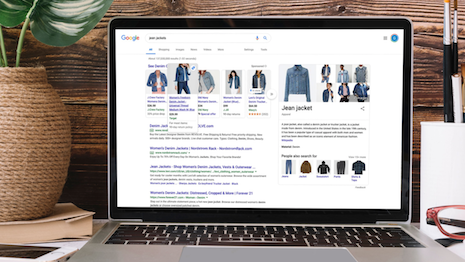 Less than 20 percent of consumers find new retailers through Google. Image credit: Yes Marketing
Less than 20 percent of consumers find new retailers through Google. Image credit: Yes Marketing Word of mouth remains the primary way consumers learn about new-to-them brands and retailers, according to a new report from Yes Marketing.
In high-cost categories, including luxury apparel, retailers need to convince consumers that their prices align with product quality. Prominently featuring product reviews, which can serve as digital word of mouth, can help retailers acquire new shoppers.
“In today’s crowded marketplace, it’s becoming more difficult for retailers to differentiate themselves from competitors,” said Nessa Felleson, senior marketing strategist at Yes Marketing. “Consumers now need an extra push prior to making a purchase from a new retailer.”
“This is especially true for consumers making decisions around expensive products like luxury clothing and accessories, and this is the reason building brand awareness has become a key focus for a number of retailers,” she said.
For its report, Yes Marketing surveyed more than 1,000 retail shoppers.
Retail recommendations
Forty-five percent of respondents discovered brands and retailers through recommendations from family and friends.
Personal recommendations can be extremely influential, as 69 percent of consumers will not purchase from a retailer with which a family member or friend had a negative experience.
Influencer recommendations are less effective than those from personal friends and family. Image credit: @your.gal.shan
Endorsements from celebrities or influencers are less effective, and only cited by 4 percent of consumers. Ten percent turned to product review Web sites or other news media, and 16 percent found new retailers through Google searches.
Hoping to capitalize on the hundreds of millions who already rely on Search, Images and YouTube throughout their shopping journeys, Google is redesigning its Shopping experience. A personalized Shopping homepage also allows consumers to search products, filter based on brands and features and read or view customer reviews (see story).
Consumers also want to be well-informed about retailers they are purchasing from for the first time.
More than a third find a retailer to be trustworthy when it provides sufficient, relevant information about its products. Ten percent also reported that customer-generated content or testimonials shape their perception of a new retailer.
Once a consumer is already familiar with a brand, effective communication is crucial for retention.
Most marketers are sending emails too frequently. Image credit: Yes Lifecycle
On average, about 40 percent of consumers do not believe retailers communicate at the right frequency across channels, whether it is email, text messages or push notifications. This includes about 30 percent of shoppers who believe marketing messages are too frequent, while 10 percent believe communication is not frequent enough.
Even after an initial purchase, consumers can be influenced by negative feedback from other shoppers, including friends and family, not to return to a retailer.
“It’s crucial for brands to build trust with their customers,” Ms. Felleson said. “Consumers are more likely to listen to a source you trust, and so messages from brands they know and trust naturally have more of an impact than those from a new brand they’ve never heard of.”
Word-of-mouth value
With large but not unlimited shopping budgets, it is important for affluent consumers to make the right purchasing decisions for themselves.
Speaking at Women in Luxury 2019 on May 9, the president of Unity Marketing explained that luxury brands need to evolve to continue attracting affluent women.
Not only are affluent American women some of the biggest spenders, they are also some of the most informed, posing a unique challenge to luxury marketers. HENRY women also spend a significant time researching products and ensuring brand positions align with their personal values (see story).
Today’s omnichannel consumers are craving more human elements in their shopping journeys, drawing them to user-generated content and personalized experiences.
Ratings and reviews are integral for shoppers, particularly when there is a visual component, according to Bazaarvoice’s Shopper Experience Index. Quality mobile experiences and personalized interactions are other ways for companies to stand out in today’s crowded marketplace.
Nearly two-thirds of shoppers, 64 percent, consider user feedback during their shopping journeys. This includes reviews and ratings, questions and answers and product photos (see story).
“Today’s consumers are highly skeptical and want to know that a retailer’s product is worth their investment,” Ms. Felleson said. “Luxury brands can encourage purchases and establish strong customer relationship by placing an emphasis on product factors like quality, reviews and the ability for existing users to share their feedback with their friends and family.”

